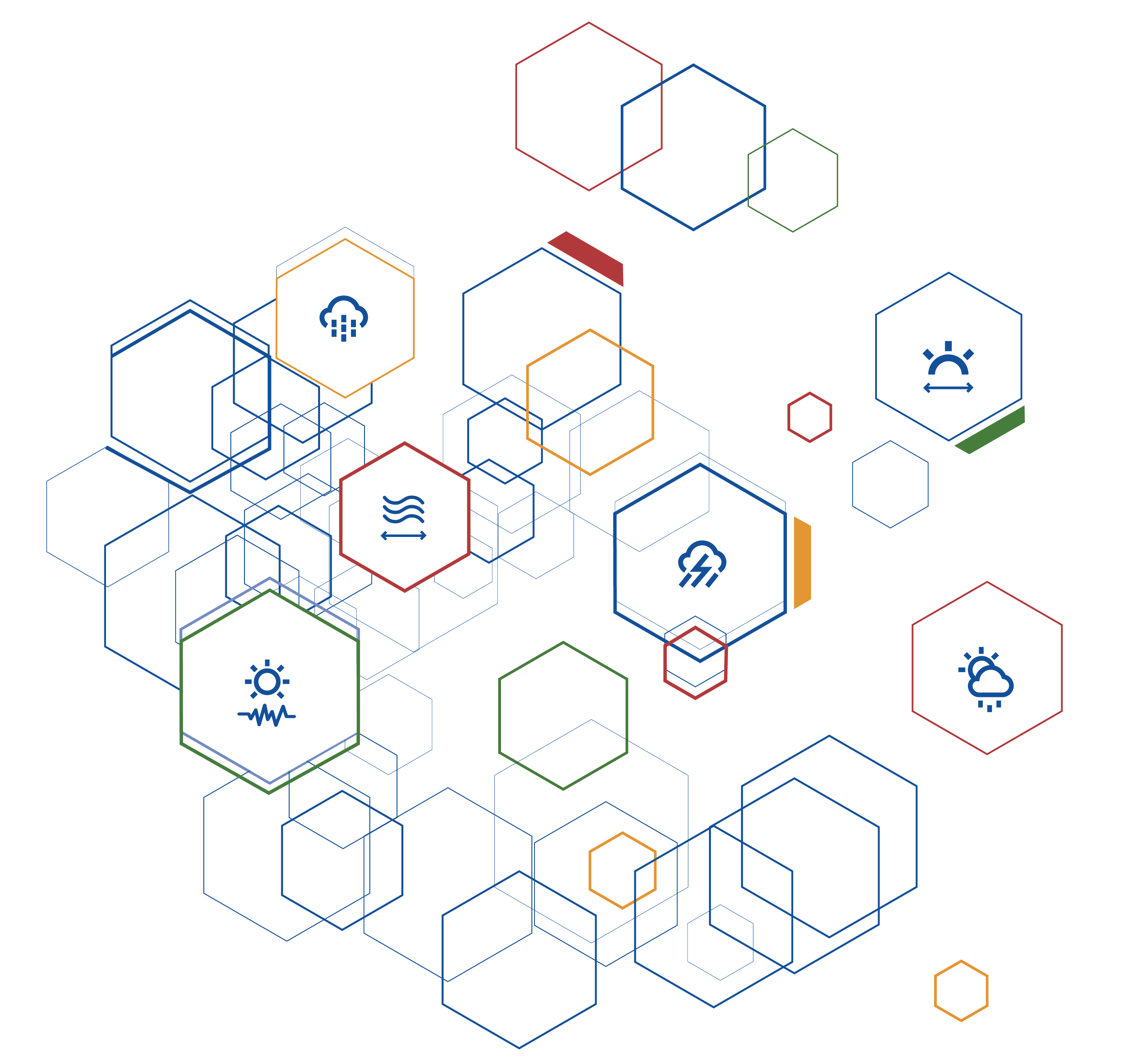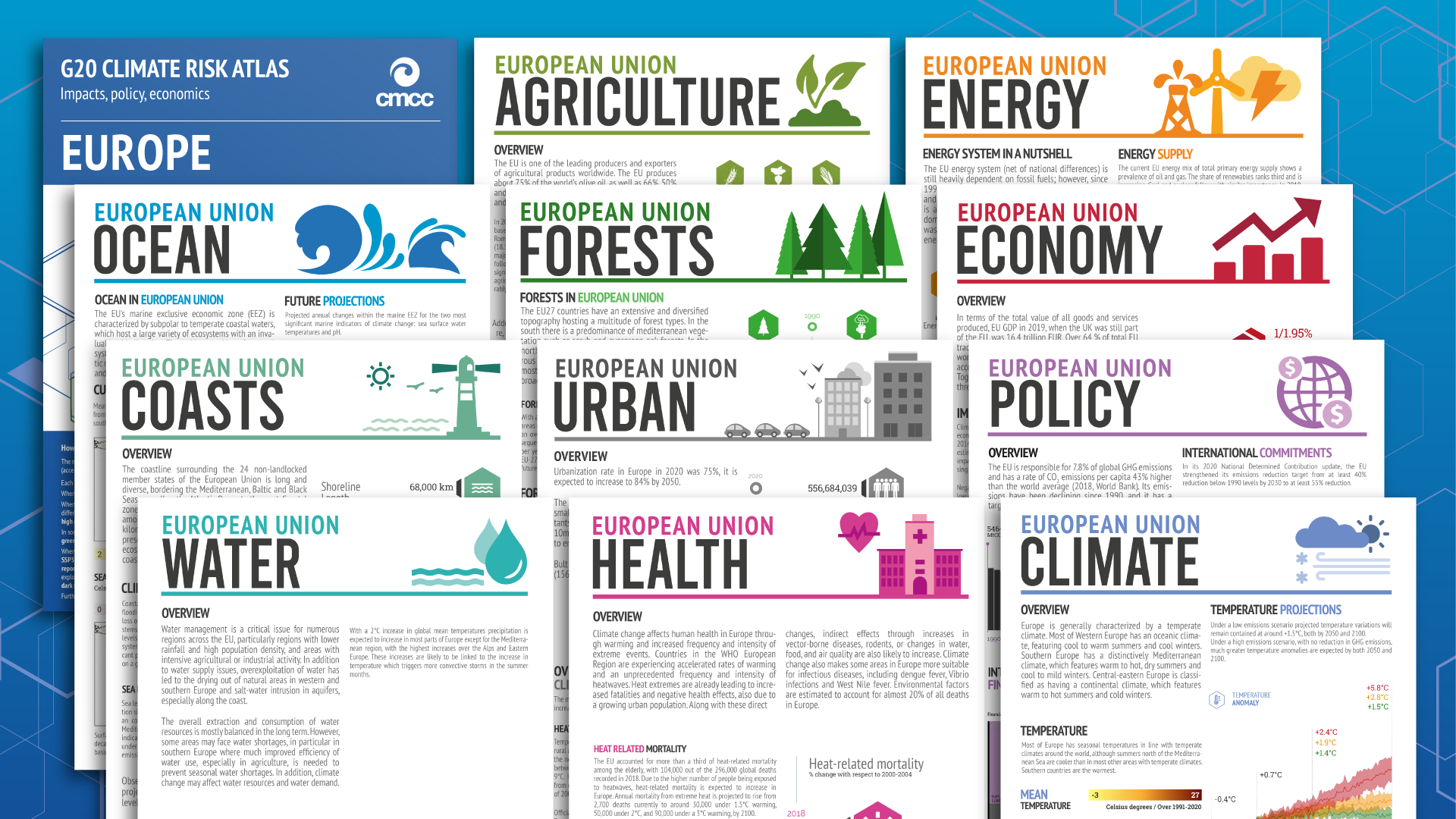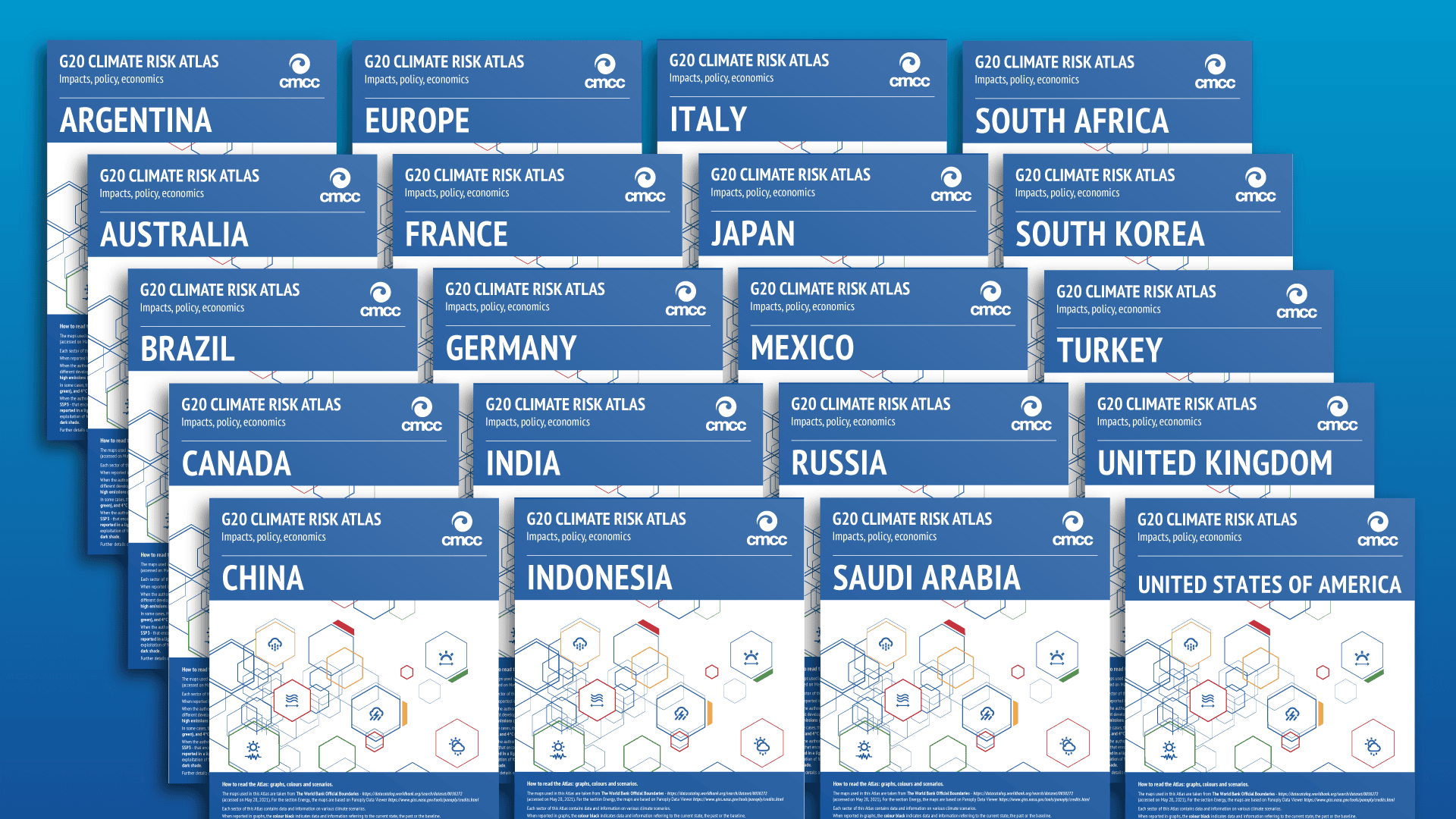
11 Sectors
41 Scientists
1,000+ references
Forewords
by Donatella Spano
CMCC Strategic Advisor
Chair G20 Climate Risk Atlas Scientific Committee
“We believe that robust scientific knowledge must be available at an institutional and governance level to guarantee social and environmental resilience. Therefore, the G20 Climate Risk Atlas represents a science-based tool that can support decision-making processes and the planning of required policies. “
The G20 Climate Risk Atlas is the contribution of the CMCC Foundation – Euro-Mediterranean Centre on Climate Change to ensuring attentive and well-informed climate action. Our scientific community responded to the European Climate Foundation’s proposal with the preparation of a summary document based on the most advanced scientific knowledge available on climate change and associated risks for the G20 countries, which represent world’s largest economies and account for over 80% of global GDP.
For each of the 20 countries, Argentina, Australia, Brazil, Canada, China, France, Germany, India, Indonesia, Italy, Japan, Republic of Korea, Mexico, Russia, Saudi Arabia, South Africa, Turkey, the United Kingdom, the United States, and the European Union, the Atlas includes an overview of the impacts, risks, and interactions with climate change that are expected by the middle and end of the century. These are assessed at the national level, under different degrees of warming and development models, with an in-depth analysis of key sectors of the G20 economies.
The 11 Climate Risk Atlas factsheets shed light on the risks faced by each country, using a clear and functional structure, with novel communication of climate risks at different levels and for different audiences. For this purpose each country/sector factsheet is designed with a mix of infographics, maps and short narrative descriptions related to relevant climate-driven hazards and key affected sectors, namely: Climate, Ocean, Coasts, Water, Agriculture, Forests and Fires, Urban, Health, Energy, Economic Impact, and Policy.
The G20 Climate Risk Atlas provides a comprehensive picture of the historical trends and future changes in climate, using available literature and data, and consolidating country-specific information within a homogenous and flexible structure. The information reported derives from enhanced intercomparison modelling exercises, data analysis, the use of indicators (such as those developed by Enel Foundation), and surveys of the most recent scientific literature, including published peer-reviewed papers, technical reports, and open access material from Horizon 2020 projects.
Although the methodologies used by different studies are highly heterogeneous, ranging from modelling comparison to statistical analysis, a significant effort was made to harmonize these findings and present them within an internally consistent framework. We believe that robust scientific knowledge must be available at an institutional and governance level to guarantee social and environmental resilience. Therefore, the G20 Climate Risk Atlas represents a science-based tool that can support decision-making processes and the planning of required policies. However, the simple language, attractive features and design also ensure that the Atlas lends itself to easy consultation and dissemination, therefore opening the door, not only to decision-makers and stakeholders, but also to the general public, creating a participatory and iterative process which can be used to increase public awareness on climate issues. The Atlas will be published when the G20 country representatives are meeting in Italy. We trust that in the process of a sustainable transition, climate change will be considered the fundamental pillar of the political agenda. Only committed and timely mitigation and adaptation actions can limit the intensification of extreme events, the destruction of ecosystems, infrastructure and populations, and in the process enable people to benefit from a better and more equitable future. This is everyone’s responsibility. Our scientific community will continue to work hard to increase knowledge, develop new scientific findings, and improve accessibility and communication of results to help build aware and informed communities. With this goal in mind, and the intention of creating wider interest and understanding in climate issues, we entrust the G20 Atlas to your reading.
Methodology and References

“Although the methodologies used by different studies are highly heterogeneous, ranging from modelling comparison to statistical analysis, a significant effort was made to harmonize these findings and present them within an internally consistent framework. “
G20 CLIMATE RISK ATLAS
Download the countries factsheets
The authors
All the authors and the members of the Scientific Committee of the Atlas are scientists at the CMCC Foundation – Euro-Mediterranean Centre on Climate Change, exceptions and any further affiliations are indicated in the following list.
SCIENTIFIC COMMITTEE
Donatella Spano1, Valentina Bacciu2, Francesco Bosello4, Giulia Galluccio, Simona Masina, Serena Marras1, Paola Mercogliano, Valentina Mereu, Jaroslav Mysiak4, Monia Santini.
AUTHORS BY SECTORS
Climate
Paola Mercogliano, Alfredo Reder, Marta Ellena
Ocean
Momme Butenschön, Tomas Lovato
Coasts
Marcello Sano, Marco Cadau, Remi Harris4, Silvia Torresan4
Water
Marco Cadau, Marcello Sano, Silvia Torresan4
Agriculture
Antonio Trabucco, Valentina Mereu, Antoine Libert, Marta Debolini, Ramkumar Tharmananthan, Alì Didevarasl, Muhammad Faizan Aslam, Mauro Lo Cascio
Forests
Valentina Bacciu2, Sergio Noce, Josè Maria Costa Saura, Claudio Ribotta, Costantino Sirca1
Urban
Margaretha Breil4, Katie Johnson4
Health
Shouro Dasgupta4
Energy
Andrea Bigano, Aisling Sealy Phelan, Enrica De Cian4, Francesco Pietro Colelli4, Shouro Dasgupta4
Economic Impacts
Francesco Bosello4, Andrea Bigano, Aisling Sealy Phelan, Alessandra Santini, Shouro Dasgupta4
Policy
Giulia Galluccio, Eugenio Sini, Eleonora Cogo, Carlo Papa3, Mirko Armiento3, Claudio Pregagnoli3, Nicolò Sartori3.
Editorial design
Element6, Mauro Buonocore
Graphics design
Element6
1CMCC and Università di Sassari, 2CMCC and CNR-Istituto per la BioEconomia, 3Enel Foundation, 4CMCC and Ca’ Foscari University of Venice
How to cite this work:
Spano D., Armiento M., Aslam M.F., Bacciu V., Bigano A., Bosello F., Breil M., Buonocore M., Butenschön M., Cadau M., Cogo E., Colelli F. P., Costa Saura J.M., Dasgupta S., De Cian E., Debolini M., Didevarasl A., Ellena M., Galluccio G., Harris R., Johnson K., Libert A., Lo Cascio M., Lovato T., Marras S., Masina S., Mercogliano P., Mereu V., Mysiak J., Noce S., Papa C., Phelan A.S., Pregagnoli C., Reder A., Ribotta C., Sano M., Santini A., Santini M., Sartori N., Sini E., Sirca C., Tharmananthan R., Torresan S., Trabucco A., “G20 Climate Risk Atlas. Impacts, policy and economics in the G20”, 2021, DOI: 10.25424/cmcc/g20_climaterisk
G20 CLIMATE RISK ATLAS
Impacts, policy, economics
is a research conducted by

with the scientific contribution of

supported by European Climate Foundation



